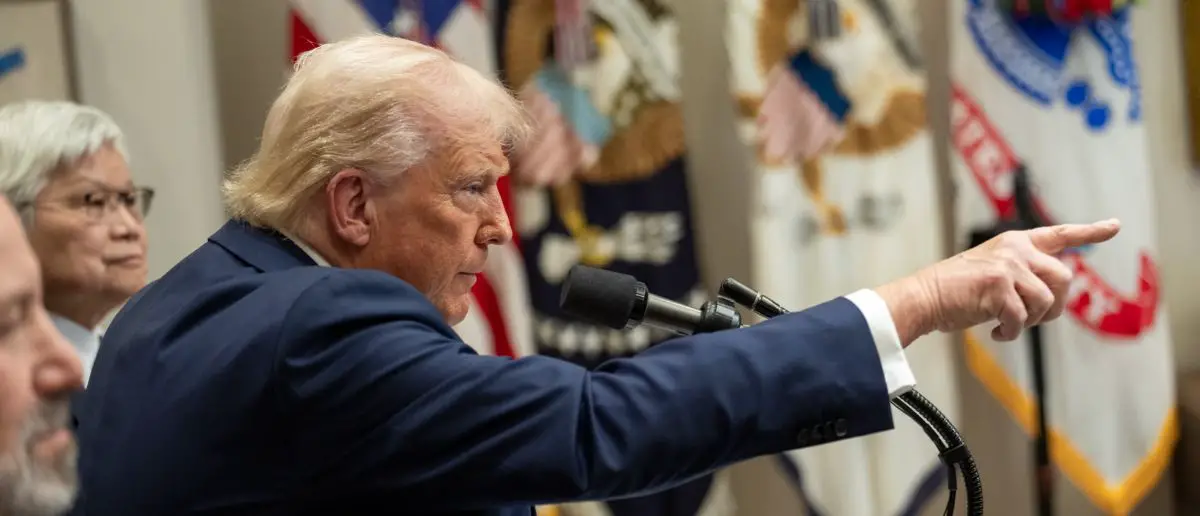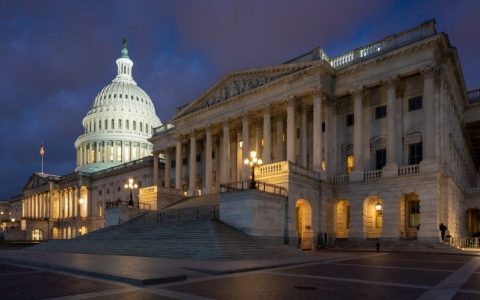
The U.S. has plenty of enemies. And they are ready to make their move at the drop of a hat.
Now the Pentagon is on high alert after a foreign nation threatened an immediate attack.
On Thursday, two Venezuelan F-16 fighter jets dared to buzz the USS Jason Dunham, a U.S. Navy Aegis guided-missile destroyer, in a pathetic attempt to intimidate America’s counter-drug operations in the Caribbean. The Pentagon called it a “highly provocative move,” stating, “Today, two Maduro regime military aircraft flew near a US Navy vessel in international waters. This highly provocative move was designed to interfere with our counter narco-terror operations.”
This weak flex by Venezuela’s dictator Nicolás Maduro, who’s been cowering under a $50 million U.S. bounty for his narco-trafficking ties, is no match for America’s overwhelming naval superiority. The U.S. Navy’s unmatched power ensures Trump’s mission to crush drug cartels and protect American lives will steamroll any interference from Maduro’s crumbling regime.
The incident came just two days after U.S. forces obliterated a Tren de Aragua drug-smuggling boat on September 2, k*lling 11 narco-terrorists in international waters. The Pentagon warned, “The cartel running Venezuela is strongly advised not to pursue any further effort to obstruct, deter or interfere with counter-narcotics and counter-terror operations carried out by the US military.” This strike, backed by President Trump’s iron-fisted anti-drug campaign, sent a clear message: America will not tolerate cartels flooding our streets with fentanyl. Maduro’s desperate flyover was a feeble response, like a mosquito buzzing a lion.
The USS Jason Dunham, an Arleigh Burke-class destroyer, is a floating fortress of American might. Armed with the Aegis combat system, 96 missile cells, and advanced radar, it can track and destroy threats from air, sea, or land with pinpoint precision. Its crew of over 300 sailors is backed by cutting-edge tech, including Tomahawk missiles and anti-aircraft defenses, making it untouchable by Venezuela’s outdated F-16s. Maduro’s jets, relics of a failing regime, are no match for the Dunham’s firepower, let alone the seven other U.S. warships—carrying over 4,500 sailors and Marines—deployed to the Caribbean in August 2025 to crush drug traffickers.
America’s naval dominance in the region is staggering. Alongside the USS Jason Dunham, the USS Gravely, USS Sampson, and USS Lake Erie form a lethal armada, supported by a nuclear-powered attack submarine and P-8 spy planes. The Iwo Jima Amphibious Ready Group, with 4,000 Marines and sailors, is conducting amphibious training in Puerto Rico, ready to project power at a moment’s notice.
This fleet, deployed under U.S. Southern Command, dwarfs Venezuela’s ragtag navy and air force, which rely on aging Soviet-era equipment and poorly trained pilots. The U.S. Navy’s technological edge and sheer numbers make Maduro’s provocation laughable.
Maduro’s regime, branded a narco-cartel by the Trump administration, is reeling. In February, the U.S. designated Tren de Aragua and Cartel de Los Soles as foreign terrorist organizations, linking them directly to Maduro’s government. Attorney General Pam Bondi didn’t mince words: “He is one of the largest narco traffickers in the world, and a threat to our national security.” The Justice Department’s $50 million bounty on Maduro’s head, announced in August, has him cornered, with his regime’s drug empire crumbling under U.S. pressure. His flyover stunt was a desperate cry for relevance, not a serious challenge.
The September 2 strike on the drug boat, which Trump celebrated on Truth Social with night-vision footage of the vessel exploding, showcased America’s precision and resolve. “The strike resulted in 11 terrorists k*lled in action. No U.S. Forces were harmed in this strike,” Trump declared. Secretary of State Marco Rubio confirmed the boat was operated by Tren de Aragua, a gang tied to Maduro, carrying drugs bound for America’s streets. Legal critics, like those cited by BBC Verify, whined about international law, but Trump’s team argues the terrorist designation justifies lethal force. When cartels threaten American lives with fentanyl, the U.S. doesn’t need permission to act.
Maduro’s whining about a U.S. “invasion” is pure theater. On September 1, he called the naval buildup “the biggest threat that has been seen on our continent in the last 100 years,” claiming America seeks regime change. His bluster, echoed by Venezuela’s UN envoy Samuel Moncada, who called the deployment “an escalation,” is just noise from a dictator losing his grip. Venezuela’s military, with its 15,000 coastal troops and new militia, is no match for the U.S. Navy’s overwhelming force. Maduro’s threats to declare a “republic in arms” are empty when faced with America’s firepower.
The U.S. Navy’s Caribbean presence is a masterclass in power projection. With destroyers like the USS Jason Dunham equipped with Aegis systems, capable of tracking 100+ targets simultaneously, and supported by F-35 jets deployed to Puerto Rico post-flyover, America’s response to Venezuela’s provocation is overk*ll by design. The USS Lake Erie, a guided-missile cruiser, and the USS Fort Lauderdale, an amphibious transport dock, add layers of dominance. Venezuela’s F-16s, bought in the 1980s, lack the avionics and training to challenge U.S. air defenses. A single Aegis destroyer could swat them from the sky.
Trump’s strategy is clear: crush the cartels k*lling Americans with fentanyl. Since taking office, he’s pushed Mexico and regional allies to step up, designating gangs like Los Lobos and Los Choneros as terrorist groups alongside Tren de Aragua. His August 2025 order to deploy eight warships, including a nuclear submarine, shows he’s done playing nice. Unlike Biden’s weak Coast Guard patrols, Trump’s military approach—backed by 4,000+ personnel—targets the source: Maduro’s narco-state. The September 2 strike was a warning shot, and Maduro’s flyover was a feeble retort.
Venezuela’s military is a shadow of America’s might. Its air force, with fewer than 20 operational F-16s, suffers from maintenance issues and pilot shortages, as reported by Reuters in 2023. The U.S. Navy, by contrast, operates over 90 destroyers and cruisers globally, with the Caribbean flotilla alone outgunning Venezuela’s entire navy. Maduro’s coastal defenses—15,000 troops and a patchwork militia—are no match for the 22nd Marine Expeditionary Unit’s amphibious capabilities. America’s technological edge, from drone surveillance to missile systems, ensures total dominance.
Maduro’s regime is crumbling under U.S. pressure. His “rigged” 2024 election, condemned by international observers, and his reliance on drug money expose his weakness. The $50 million bounty, up from $15 million in 2020, has allies like Russia and China hesitant to back him. X posts from @AmericaFirst1776 on August 20, cheer Trump’s “no-nonsense” approach, reflecting patriot support for crushing Maduro’s narco-empire. His F-16 stunt was a last-ditch effort to look tough, but it only highlights his desperation.
The legal critics, like Democrat Ilhan Omar, who called Trump’s strike “lawless,” miss the point. “Congress has not declared war on Venezuela, or Tren de Aragua, and the mere designation of a group as a terrorist organisation does not give any President carte blanche to ignore Congress’s clear Constitutional authority on matters of war and peace,” Omar said. But when cartels, backed by Maduro, flood America with drugs k*lling thousands, waiting for UN approval isn’t an option. Trump’s use of the Alien Enemies Act to target narco-terrorists shows he prioritizes American lives over globalist red tape.
America’s superiority isn’t just military—it’s moral. Trump’s mission to stop fentanyl, which k*lled over 70,000 Americans in 2024 per CDC data, is about saving heartland communities. Maduro’s regime, profiting off this poison, has no leg to stand on. His flyover was a publicity stunt, not a threat. The USS Jason Dunham’s crew, backed by the Navy’s unmatched arsenal, didn’t even flinch, proving America’s readiness to dominate any challenge.
The Caribbean is America’s backyard, and Trump’s naval buildup ensures it stays that way. With destroyers, submarines, and Marines ready to act, Maduro’s provocations are like a child taunting a giant. The U.S. Navy’s ability to conduct precision strikes, as seen in the drug boat’s destruction, shows its unmatched lethality. Venezuela’s outdated jets and crumbling military can’t compete with America’s technological and numerical edge.
As Trump’s agenda rolls forward, the Navy’s presence will keep cartels on the run. Maduro’s F-16 flyover was a desperate cry from a failing dictator, answered by America’s overwhelming might. The USS Jason Dunham and its sister ships stand as a wall against narco-terrorism, protecting the American people and ensuring Trump’s promise to crush the cartels is unstoppable.





